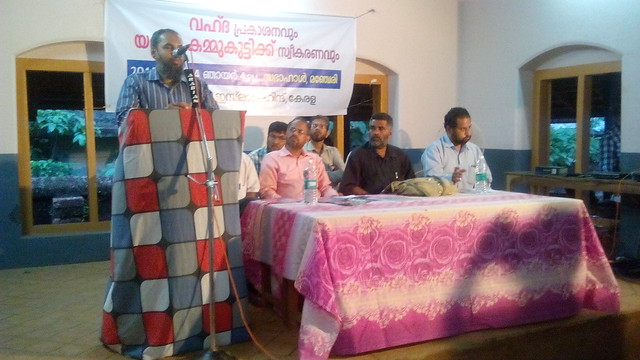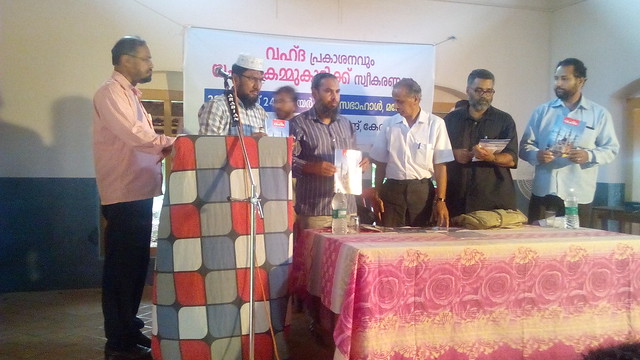By V A Mohamad Ashrof for TwoCircles.net,
Malappuram (Kerala): Yahya Kammukutty, an IT professional, who was recently freed by a Hubli court after spending seven years in jail for alleged involvement in terror activities, was felicitated by Wahdate Islami Hind, Kerala chapter here.
The programme was held at Sabha Hall, Manjery, Malappuram district on May 24, 2015.

Yahya Kammukkutty speaking
Kammukutty and 16 others, all members of the banned Students’ Islamic Movement of India (SIMI), who were allegedly involved in terror activities across the state, were acquitted by a Hubli court on April 30, 2015 after the prosecution failed to prove charges.
The prosecution failed to prove illegal possession of arms and explosives and (their) involvement in illegal activities, besides under several sections of the Indian Penal Code.
Dr P Muhammad Ishaq, Kerala Ameer of Wahdate Islami Hind, was on the chair. “Congress government hatched out a draconian law to incriminate innocents, particularly Muslim minority community members. All those who protested government policies are targeted as Maoists,” he said, and asked to publish a white paper on the use of Unlawful Activities (Prevention) Act (UAPA). “The silence of the mainstream political parties on this vital issue is frightening minorities,” he said.
Advocate PA Pauran of the PUCL explained the historical origin of UAPA. He argued that the governments passed the bill in a mysterious circumstance in order punish disagreeing voices. “From TADA through the Prevention of Terrorism Act (POTA) to the various incarnates of UAPA, the lesson for us has been that such laws do not necessarily prevent terror crimes but do lend themselves to gross misuse, another act of terrorism,” he said.
Pointing out that POTA was enacted in the aftermath of the December 2001 attack on Parliament, another puzzling incident, which was despite shameful instances of human rights violations recorded during the pendency of TADA, which in fact led to its repeal, Pauran said, POTA’s definition of what constituted a ‘terrorist act’ was too broad, criminalizing even political activism.
“The law permitted prolonged detentions without charge and reversed the presumption of innocence which is the bedrock of the criminal justice system. In line with the UPA’s Common Minimum Programme, which vowed to banish terror-specific laws, the Manmohan Singh government repealed POTA. But in an unanticipated act of betrayal, it also reintroduced some of POTA’s stringent provisions in an altered version of UAPA, amending the law a second time in the wake of the November 2008 Mumbai terror attacks, another baffling incident.”
Naim Thottathil, Wahdate Islami Hind state executive committee member, accused that the Bill criminalizes the raising of funds “from legitimate or illegitimate source” and unnecessarily replicates crimes already covered under the IPC such as the “production and distribution” of “high quality counterfeit currency.”
“The bill was prepared from a communal and fascistic mindset. It is a litmus test of the survival of Indian democracy. Congress is as bad as BJP in their Islamophobic outlook,” he alleged.
Vilayodi Sivankutty, another human right activist, argued that it is ludicrous that in a civilized democratic society like India, a citizen may be practically abducted by police, charged with unthinking offences and incarcerated without bail on mere suspicion for an indefinite period of time. But, this is indeed the situation in present-day India, with duly passed legislation sanctioning the inhumane state of affairs. “On May 9, 2014, an English professor at a Delhi University college, Professor G N Saibaba was blindfolded and pushed into a police vehicle while on his way home from work. He was taken to jail, where he was kept in a solitary cell; further, he was allowed no contact with his family. Despite being a 90% disabled, wheelchair-bound cardiac patient with chronic back pain, he was placed in a cell without the legally required ramps and toilets required for disabled inmates,” Sivankutty said.
The UAPA has proven to be a deeply regressive legislation that has, and will, continue to be used to promulgate police abuse of civil rights of Indian citizens. There is an immediate need for some sort of checks and balances system that will safeguard the interest of any innocent accused while still enforcing the objectives and rationale behind the formation of such and act. At the time of each Amendment, there were assurances that there would and could be no misuse of the law. However, various situations have proven these guarantees untrue. As has been noted in a citizens’ petition against the Amendment; “In delivering justice, laws cannot rest on assurances.” The lack of checks and balances creates a system starkly biased in favour of the State.
Advocate S Shanavas, president of Minority Rights Watch, said that India being a signatory of UDHR-1948 cannot pass such draconian laws. Those who passed such a bill in the Parliament should be brought to trial in the International Court of Justice. He quoted two sentences from the document of Human Rights Watch: “While India has a responsibility to protect citizens from terror attacks, the counterterrorism law has long been abused to detain suspects for excessive periods, file charges on fabricated evidence, and ban organizations without due process of law. The UAPA is a dangerous tool in the hands of officials who seek to oppress peaceful critics and minority communities.”

Salam Kootilangadi, Wahdate Islami Hind state secretary, blasted out at the Congress in playing with BJP in oppressing Muslim minority organizations. Human dignity is sacrosanct as the Qur’an depicted in verse 17:70. UAPA is a gross violation of this holy verse. “This repressive law violates the rule of law and as such should be annulled,” he lamented and said, there isn’t even a public debate over the UAPA and its misuse, because, in the dominant public discourse, its victims are deemed guilty till proven innocent. Leftist parties and Janatha Parivar should handle the issue and pressurize the government to repeal this law.
Yahya Kammukutty chronicled the bitter experiences of torture he encountered from various corners: media, police and judiciary. “I was targeted just because of I was a progressing IT professional and a firm believer of Islam. Constitutional guarantee of treating innocent until proven guilty was drastically overrun in my case. No youth, nay, no human person should stumble upon such a harsh experience.”
Syed Bukhari, central Shura member and Tamil Nadu Ameer of the Wahdate Islami Hind, released the first issue of “Wahda,” the Malayalam organ of Wahdate Islami Kerala chapter, by handing over the copy to Yahya Kammukutty.
Two resolutions were passed during the programme: The first was on the repealing of UAPA, which partially read as follows:
“The UAPA is far removed from any notion of justice. This law is designed to give the state limitless power to choose the group, the section, the political opinion that it wishes to describe as criminal and to attack it with legislated violence. Hence the UAPA is merely a weapon in the hands of governments masquerading as a statute of the judicial system. Through this law governments have obtained the power to label whatever organization they find uncomfortable as unlawful and terrorist. The UAPA topples every tenet of a democracy, violates the fundamental rights enshrined in the Constitution, violates every provision in the criminal justice system meant to safeguard the innocent, and every international covenant and declaration concerning rights of the individual. The continued operation of the UAPA and its predecessors like the TADA, POTA and similar state laws over the last 25 years have slowly and silently eroded legal procedures and constrained democratic spaces through provisions which curb the formation of associations, collective expression of dissent, and finally attack the life and liberty of the individual and their right to free expression. Its logical outcome is to silence people at large when government policies threaten their land, resources, and livelihood. Wahdate Islami Hind resolves to intensify the struggle for the repeal of the UAPA and to decriminalize legitimate democratic activity. It resolves to organize protests against the law throughout the country.”
The second resolution demanded the Egyptian army to desist from cruelty and brutality, go back to barracks, and hand over power to the elected representatives of the people. Mursi’s party, which won 236 seats, has been removed from power while the left party which won a mere 16 seats has become part of the ruling establishment. Removing of Mursi who received 51% votes is a massacre of democracy and aspiration of the people. Now the Military junta is trying to crush Mursi and his party men just like a pharaoh. The resolution called to repeal the military rule and bring back Mursi government.
The resolutions were presented by Shafeeq Cannoor.
P P Zubair Mukthar, state executive member of Wahdate Islami Hind, expressed vote of thanks.
Related:
Karnataka court acquits 17 suspected SIMI youths in a 7-year-old Unlawful Activities case

